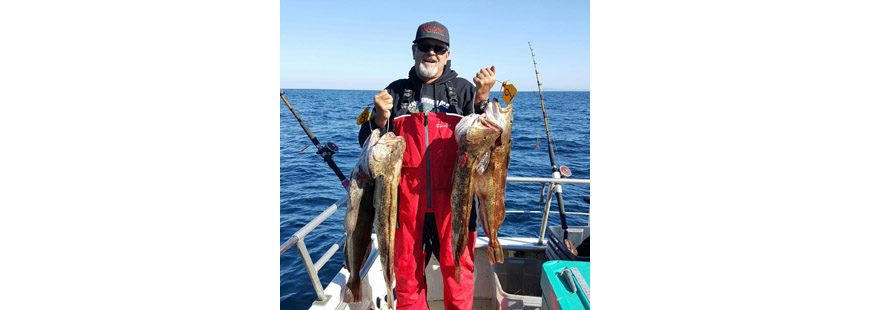Photo: Lingcod from a deep-reef bottomfishing trip out of Garibaldi, Oregon 10-12-16 (photo courtesy Garibaldi Charters)
I’m the new kid on the block. Not necessarily on fish policy, but more on water management and what it means for developing fish policy that is, in fact, fish-friendly.
I’m a Governor’s appointee on the legislatively driven task force on Drought Emergency Response. Now, I’ve participated in a good handful of committees, councils and maybe even a task force, and although I can interject some thoughts and suggestions into this process, I’m the “rookie at bat” when it comes to knowing my way around this issue.
I do believe it’s important work, and I’m one of only three conservation voices on a 13-member task force, with folks from municipalities, industry and the agricultural community, all of who have been working in this realm much longer than I have. That seems to be a key theme in the fishing community and industry; we’re a bit late to the game (c’mon, it IS October, although baseball really isn’t my thing…).
Just like I tell my fellow anglers after a skunk day of fishing, if you go fishing, and don’t catch anything, AND you’re paying attention, you can still learn something from your time on the water. Don’t view it a wasted effort, but you do have to pay attention. That’s a pretty tall ask for a fishing guide in an 8-hour water policy meeting.
We’re just about 5 meetings into the process, with hopefully only a few more to go, but I’m still learning the personalities and checking my member sheet several times over the course of the day to see who represents what entity. I really can’t complain about the make-up of the task force; municipalities and agriculture certainly do have critical ties to water supplies. Our conservation voices are present to make sure fish have a voice in this process too.
One phrase struck me particularly deeply in today’s meeting, however. When discussing options to move forward as recommendations to the legislature (for eventual appropriate funding, of course), one stakeholder said something that got under my skin. When talking about incentives, which I am not opposed to, he stated, “There should be a reward, for successively navigating all of these processes.” Now again, I can’t necessarily disagree but it set the tone for at least one person in this group; do people actually think that publicly owned water is a right, instead of a privilege?
Now that I’m thinking about it, it brings me back to the feeling I had when the Malheur National Wildlife Refuge takeover was underway. I know there is obviously a stark difference here (my fellow task force members are far from terrorists), but to think any one person can own a public resource is flat out crazy in my mind. I don’t even think that my fellow task force members feel this way but they must call it a water “right” for a reason….
Then I started learning about senior and junior water rights and where fish fall into this pecking order. I was surprised to learn that Oregon has no mandatory minimums for instream flows for fish and wildlife, but relieved to learn that voluntary measures have been somewhat successful in restoring stream flows for fish and wildlife. The theme today, and most days, is that no one wants to harm fish or wildlife, but we have real American people, growing food and watering cattle, and our citizens, that rely on water for their everyday lives. How can a consumptive user such as myself argue with that?
But what really will happen when we see our next drought, or realize that our meteorologist’s climate change models ARE actually coming to fruition? How will fish and our fishing industry get prioritized then?
The title of this topic was, “Need to Anticipate and Mitigate Versus Respond.” I have to go back to our community’s recent proactive victory just this September, when we won state protections for unmanaged forage species. There was no directed commercial or sport fishery on these critical forage fish, but given the trajectory of the world-wide hunger for protein sources, you can bet your bottom dollar that there will be. How about a more recent example, when the commercial fleet was slowed in the lower Columbia River, after having caught over half of the total Oregon and Washington allowable quota for anchovies, destined for Asian markets. I’ve said it once and I’ll say it again, we need to look ahead in a proactive manner, rather than looking back and fixing the mistakes we knew were coming. I think the task force we really need to convene is the “task force on what the hell is it going to take to keep our fisheries sustainable, and address the real threats that we’ll face in the next 50 years.”
Most in the conservation community would agree that we won’t get the chance in the upcoming Congress to utilize visionary guidelines to direct the next reauthorization of the Magnuson-Stevens Act. There are so many bad provisions in the draft legislation that we’ll be expending enough energy just holding onto the gains we’ve made from the last reauthorization.
Now is not the time to look back because there is simply too much at risk, too many unknowns and certainly too many “senior water right users” that may believe their needs outweigh the needs of a larger community of people. Ever since our imperiled fish species have required a strong conservation look, the end user, the sport angler has bore the bulk of the burden for recovery. Isn’t it about time that our voices were equal in strength to other industries competing for the same finite natural resources that our fish depend on?


